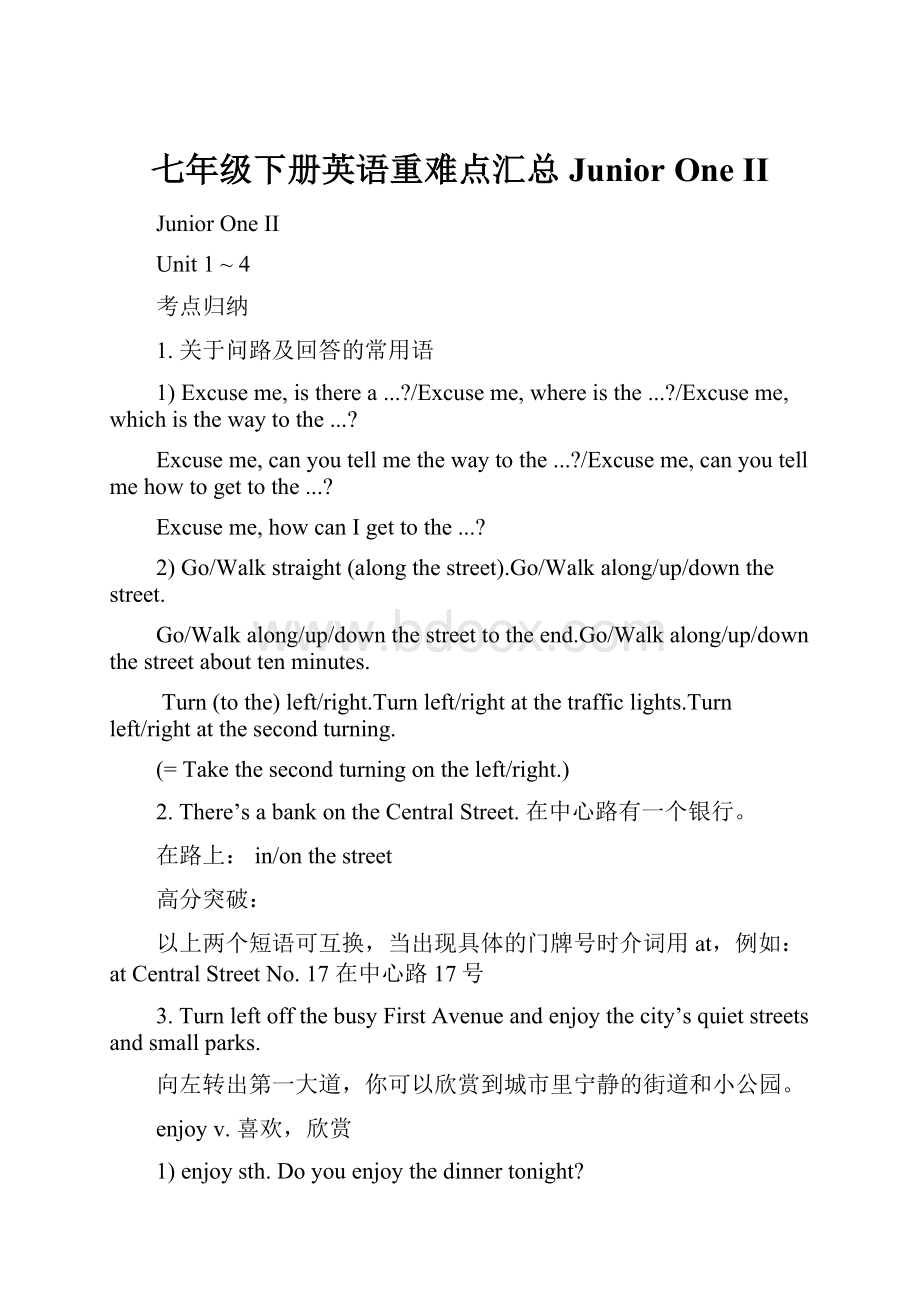七年级下册英语重难点汇总Junior One II.docx
《七年级下册英语重难点汇总Junior One II.docx》由会员分享,可在线阅读,更多相关《七年级下册英语重难点汇总Junior One II.docx(36页珍藏版)》请在冰豆网上搜索。

七年级下册英语重难点汇总JuniorOneII
JuniorOneII
Unit1~4
考点归纳
1.关于问路及回答的常用语
1)Excuseme,istherea...?
/Excuseme,whereisthe...?
/Excuseme,whichisthewaytothe...?
Excuseme,canyoutellmethewaytothe...?
/Excuseme,canyoutellmehowtogettothe...?
Excuseme,howcanIgettothe...?
2)Go/Walkstraight(alongthestreet).Go/Walkalong/up/downthestreet.
Go/Walkalong/up/downthestreettotheend.Go/Walkalong/up/downthestreetabouttenminutes.
Turn(tothe)left/right.Turnleft/rightatthetrafficlights.Turnleft/rightatthesecondturning.
(=Takethesecondturningontheleft/right.)
2.There’sabankontheCentralStreet.在中心路有一个银行。
在路上:
in/onthestreet
高分突破:
以上两个短语可互换,当出现具体的门牌号时介词用at,例如:
atCentralStreetNo.17在中心路17号
3.TurnleftoffthebusyFirstAvenueandenjoythecity’squietstreetsandsmallparks.
向左转出第一大道,你可以欣赏到城市里宁静的街道和小公园。
enjoyv.喜欢,欣赏
1)enjoysth.Doyouenjoythedinnertonight?
2)enjoy+doingsth.喜欢做某事Jackenjoysplayingthedrum.
3)enjoyoneself玩得高兴=haveagoodtime=havefun
Theyenjoyedthemselvesinthezooyesterday.=Theyhadagoodtimeinthezooyesterday.
=Theyhadfuninthezooyesterday.
4.TakeawalkthroughtheparkonCentralAvenue.
步行穿过中心大道的公园。
1)散步:
takeawalkhaveawalkgoforawalkwalk
2)through穿过(立体的)……across穿过(平面的)……
例如:
go/walk/run/drivethroughtherain/forest/city
go/walk/run/driveacrossthestreet/road/bridge/avenueswimacrosstheriver
高分突破:
Gothroughthestreet.顺着这条街走。
Goacrossthestreet.(横穿)过马路。
5.Nexttothehotelisasmallhousewithaninterestinggarden.
在宾馆旁边是一幢有一个有趣花园的小房子。
1)形容词作定语修饰名词放在名词的前面,例如:
anewteacherafantasticmovieanexcitingsoccerballgame
2)形容词修饰不定代词放在不定代词的后面,例如:
somethingdangerousanythingdifferent
3)介词短语、分词作定语放在所修饰词的后面,例如:
aT-shirtlikethis/astudentinNo.14MiddleSchool/theboywithshortcurlyhair/thegirlinredsweater
themanwearingapairofnewshoesthekitemadebuyLucy
高分突破:
对介词短语、分词定语提问时疑问代词常用which
Themaninthecarismyfather./Whichmanisyourfather?
6.Thisisthebeginningofthegardentour.这是花园旅行的开始。
1)atthebeginningof:
在...开始的时候,例如:
atthebeginningofthisweek/month
Atthebeginningofamathclasssheusuallyasksaquestion.
Tomsingsasongatthebeginningofthemusicfestival.
反义词组:
attheendof:
在...结束的时候attheendofthisyear/February/UnitTwo
2)inthebeginning在开始的时候,例如:
Hecouldn’tspeakChineseatallinthebeginning.
反义词组:
intheend最后
3)beginner初学者
7.Letmetellyouthewaytomyhouse.让我告诉你去我家的路。
1)thewayto……到……去的路theanswerto…………的答案
thekeyto…………的答案,……的钥匙
theguideto…………的指南thedirectionto……到……去的路、方向
2)onthewayto……在去……的路上onone’swayto……在某人去……的路上
inone’swayto……挡在某人去……的路上
高分突破:
在这几个短语中如果后接home,here,there这几个副词,须将to去掉。
例如:
onthewayhome/here/there
8.Whydoyoulikethem?
Becausethey’rekindofcute.你为什么喜欢它们?
因为它们有点可爱。
1)英语表达中不能连用的词:
①because和so,例如:
BecauseIlikethetoys,Iwillbuyalot.(√)
BecauseIlikethetoys,soIwillbuyalot.(×)
②though/although和but,例如:
Though/AlthoughIlikethetoys,Iwillbuyalot.(√)Though/AlthoughIlikethetoys,butIwillbuyalot.(×)
2)有点,稍微:
kindof
=alittle
=alittlebit+adj.
=abit
高分突破:
1)kindof在某些短语中表示种类,例如:
allkindsof各种各样的
differentkindsof各种各样的,不同种类的manykindsof许多种的this/thatkindof这/那种的
akindof一种……
2)alittle+不可数名词“一点…”,前面常与only连用。
little+不可数名词“几乎没有…”,前面常very与连用。
注意两个翻译:
Thereisalittlesheep.有一只小绵羊。
/Thereisalittlewater.有一点水。
3)notabit=notatall/notalittle=verymuch
9.Isn’thecute?
难道他不可爱吗?
难道它不在你的包里吗?
是的,它不在。
否定疑问句的构成:
用not的简略式-n’t与句首的be,have,has,助动词或情态动词连用,开始一个问句。
否定疑问句用来表达一种强烈的肯定或惊奇、赞扬、责备、建议等,回答是根据实际情况或事实用yes和no。
例如:
Isn’titaninterestingTVshow?
Yes,itis./No,itisn’t.
Can’tyoudoitbyyourself?
Yes,Ican./No,Ican’t.
高分突破:
1)回答时应与事实一致,而不应按汉语的习惯来做答。
2)回答时注意一致性,即Yes+肯定,No+否定。
以下的回答是错误的:
Aren’ttheyours?
Yes,theyaren’t./No,theyare.
10.Whatotheranimalsdoyoulike?
你还喜欢别的什么动物?
1)other,others
otheradj.other+可数名词的复数/不可数名词“其他的……,另外的……”,不单独使用。
例如:
Ineedotherdictionaries.otherspron.others=other+可数名词复数
例如:
Idon’tliketheseshorts,pleasegivemesomeothers(=othershorts).
2)other,another
otheradj.other+可数名词的复数/不可数名词“其他的……,另外的……”(三者以上),不单独使用。
anotheradj.another+可数名词单、复数“另一个(一些)……”(三者以上),可单独使用(此时为代词)。
例如:
Doyouwantanothercupofcoffee?
/Weneedanotherthreechairs(=threemorechairs)
3)theother,theothers
one…theother(theother+可数名词单数)一个……另一个
some…theothers(theother+可数名词复数)一些……另一些
11.Whatwouldyoulike?
你想要什么?
1)wouldlikesth.想要什么wouldliketodosth.想做什么wouldlikesb.todosth.想某人做某事
2)同义句互换:
Whatkindoffoodwouldyoulike?
=Whatwouldyouliketoeat?
3)请你……。
(注意两个交际英语的区别)Wouldyouliketodosth.please?
Wouldyoupleasedosth.?
例如:
请你把书放进抽屉里。
Wouldyouliketoputthesebooksinthedrawer,please?
Wouldyoupleaseputthesebooksinthedrawer?
12.What’syouraddress?
你的地址是哪里?
=Wheredoyoulive/work…?
高分突破:
对address提问疑问代词用what,不能用where。
Whereisyoure-mailaddress?
(×)
13.Wealsohavegreatsaladaswellassoda.
我们还有配有苏打水的沙拉。
=Wealsohavegreatsaladwithsoda.
高分突破:
with和aswellas连接主语时,谓语动词的单复数由with和aswellas前面的主语决定;但是and连接主语时谓语动词用复数,例如:
TonyaswellasBillgoestomovieseveryweek.
=TonywithBillgoestomovieseveryweek.=TonyandBillgotomovieseveryweek.
14.英语中对职业的提问:
Whatdoeshedo?
=Whatishe?
=What’shisjob?
高分突破:
what是对人的职业提问,而who是对人的身份提问,因此在回答时要注意区别:
Who’sthatman?
He’smyuncle./What’syouruncle?
He’sapoliceman.
15.Peoplegivemetheirmoneyorgettheirmoneyfromme.
人们给我钱或是从我这里拿走他们自己的钱。
givesth.tosb.=givesb.Sth.
类适用法的词还有:
lend,show,pass,send,bring,sell,offer,hand,teach,tell,return,throw,wish等。
高分突破:
当sth.为代词it或them时,只能用:
giveit/themtosb.的结构。
16.Iwearawhiteuniform.我穿一套白色的制服。
wear,puton,dress,bein
1)wear“穿着”,表状态=bein
Shewearsapurplesweatertoday.=She’swearingapurplesweatertoday.=She’sinapurplesweatertoday.
wear“留,蓄”wearabeard留胡子wearlonghair蓄长发wearsunglasses戴太阳眼镜
2)puton“穿上”,表动作Tomisputtingonhisshirt.
3)dress“穿”,可表动作或状态dresssb.=getsb.dressed给某人穿衣服
Heistooyoungtodresshimself.=Heistooyoungtogethimselfdressed.
17.Imeetinterestingpeopleeveryday.我每天遇见有趣的人。
1)meet“遇见,认识,迎接”例如:
Ilikemeetingdifferentpeopleeveryday.Nicetomeetyou.
Wouldyoupleasemeetherattheairport?
2)everyday副词词组,表示“每天,天天”,在句中作状语。
everyday形容词,表示“日常的,每日的”,在句中作定语。
Somepeopleareveryinterestedinthestars’everydaylife.有些人对明星的日常生活非常感兴趣。
Peterpracticeshistrumpeteveryday.Peter每天都练习吹喇叭。
18.Doyouwanttoworkforusasareporter?
你愿意为我们工作吗?
是当记者?
1)workfor为……工作Jeffworksforabigcompany.
2)workas当……Wouldyouliketoworkasawaiter?
3)workat/in在哪里工作Hisbrotherworksinafamoushotel.
Ⅳ.语法精讲
一般现在时
1.构成:
一般现在时主要由动词的原形表示,当主语是第三人称单数时,则在动词原形后加-s或-es,词尾读音分别为/s/,/z/和/iz/。
规则如下:
规则
例词
一般动词在词尾加-s
在清辅音后读/s/
在元音和浊辅音后读/z/
help–helps
work–works
climb–climbs
在以字母s,x,o,ch,sh结尾的动词后加-es;
如词尾已有e,则只加-s,读作/iz/
teach–teaches
guess–guesses
close–closes
以辅音字母+y结尾的动词,变y为i后,加-es,读作/z/
study–studies
fly–flies
高分突破:
动词have和be的第三人称单数形式为:
has和is。
2.一般现在时的肯定、否定、一般疑问句式及回答。
列表如下:
行为动词(以do为例)
肯定式
否定式
一般疑问句式及回答
I
We
Youdo...
They
I
We
Youdon’tdo...
They
DoIdo...?
Yes,youdo.
No,youdon’t.
Dowedo...?
Yes,you(we)do.
No,you(we)don’t.
Dyoudo...?
Yes,I(we)do.
No,I(we)don’t.
Dotheydo...?
Yes,theydo.
No,theydon’t.
He
Shedoes...
It
He
Shedoesn’tdo...
It
Doeshe(she,it)do...?
Yes,he(she,it)does.
No,he(she,it)doesn’t.
(don’t=donot;doesn’t=doesnot)
动词be
肯定式
否定式
一般疑问句式及回答
Iam...
Iamnot...
AmI...?
Yes,youare.
No,youaren’t.
He
Sheis...
It
He
Sheisn’t...
It
he
Isshe...?
it
Yes,he(she,it)is.
No,he(she,it)isn’t.
We
You
Theyare...
...
We
You
Theyaren’t...
...
Arewe...?
Yes,youare.
No,youaren’t
Areyou...?
Yes,weare.
No,wearen’t.
Arethey...?
Yes,theyare.
No,theyaren’t.
(isn’t=isnot;aren’t=arenot)
3.一般现在时的用法
1)表示经常发生的动作、存在的状态或现阶段的习惯。
常用时间状语:
often,always,usually,everyday,onSundaysetc.例如:
Heoftengoestoworkonfoot.
2)表示客观事实和普遍真理。
例如:
Threeandfourisseven.Theearthtravelsaroundthesun.
3)表示现在的状态和外部特征。
例如:
Youlookfantastictoday.
4)表现在的喜好、愿望、观点等。
例如:
Hehopestoseeyousoon.
5)表示已安排或计划好将来必定会发生的动作或状态,即用一般现在时表示将来,一般用动词:
be,come,go,arrive,leave,startetc.例如:
Histrainleavesat2:
00thisafternoon.
6)有几个由here,there开头的句子,动词用一般现在时表示现在正在发生的动作。
例如:
Theregoesthebell.铃声响了。
Herecomesthebus.车来了。
高分突破:
在含时间和条件状语从句的复合句中,主语用一般将来时,从句则用一般现在时表示将来的动作。
例如:
Iwillstayathomeifitrainstomorrow.
She’llcometomyhomeassoonasshearriveshere.
[考点聚焦]
I.词组归纳
1.在邮局和电子游戏中心之间________________2.在公用电话对面_________________
3.带我的狗去散步_________________4.打的去……_________________
5.玩得高兴_________________6.在附近_________________
7.直走_________________8.向左转_________________
9.在图书馆的右边_________________10.欢迎来到花园小区!
_________________
11.一幢有一个美丽花园的房子_________________12.……的开始__________________
13.一个消遣的好地方_________________14.去我家的路__________________
15.有点儿,稍微___________________16.在晚上___________________
17.吃草和树叶__________________18.想要,愿意__________________
19.青椒___________________20.冰茶___________________
21.也,还,而且___________________22.比萨快递___________________
23.点一份比萨___________________24.看菜单____________________
25.售货员_________________26.警官_________________
27.银行职员_________________28.警察局_________________
29.出去,外出_________________30.想成为_________________
31.与……一起工作__________________32.把某物给某人_______